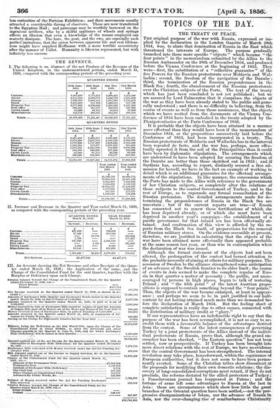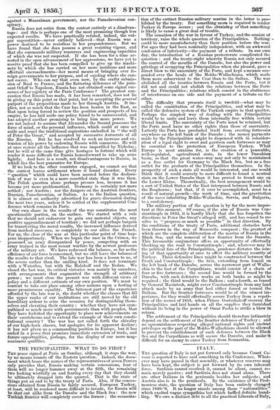TOPICS OF THE DAY.
THE TREATY OF PEACE.
THE original purpose of the war with. Russia, expressed or iv- plied by the declaration in the London Gazette of March 28th 1854, was-' to abate that domination of Russia Mthe East which threatened the interests of Europe. The purpose gradually branched into those more specific -t' objects " which became " the four points " in the memorandum submitted by the Allies to the Russian Ambassador on the 28th of December 1854, and produced before the Vienna Conference at the beginning of 1855. They were-first, the substitution of a " collective guarantee " of the five Powers for the Russian protectorate over Moldavia and Wal- lachia ; second, the freedom of the navigation' of the Danube"; third, the termination of the Russian preponderance in the Black Sea ; fourth, the abandonment of the Russian protectorate over the Christian subjects of the Porte. The text of the treaty which has just been concluded is not yet published ; but we are assured by Lord Palmerston that it comprises the objects of the war as they have been already stated to the public and gene- rally understood ; and there is no difficulty in believing, from the course of events as well as from those assurances, that the objects which we have recited from the documents of the Vienna Con- ference of 1855 have been embodied in the treaty adopted by the Plenipotentiaries at the Paris Conference of 1856.
It is probable that the objects have been attained in a manner
more effectual than they would have been if the memorandum or December 1854, or the propositions successively laid before the Conference of 1855, had been incorporated in a treaty. The Russian protectorate of Moldavia and Wallachia has in the interval been repealed de facto, and the war has perhaps' more effec- tually uprooted it from the soil of the Principalities than it could have been by diplomatic stipulations. The arrangements which are understood to have been adopted for securing the freedom of the Danube are better than those- sketched out in 1855.; and. if Sardinia has, according to report, distinctly secured a free ad- mission for herself, we have in the fact an example of working in detail which is an additional guarantee for the effectual arrange- ments of the stipulations. In like manner, the concessions which the Porte has made to the Allies with reference to the government of her Christian subjects, so completely alter the relations of those subjects to the central Government of Turkey, and to the rest of Europe, as to supersede any formal resuscitation of the Russian pretension. The detailed arrangements made for de- termining the preponderance of Russia in the Black Sea are uncertain ; but if the current reports are true-if Russia has consented not to renew those fortifications of which she has been deprived already, or of which she must have been deprived in another year's campaign-the establishment of a pacific governance for that inland sea has been effectually at- tained. And confirmation of this view is afforded by the re- ports from the Black Sea itself, of preparations for the removal of Russian military stores. On the evidence accessible at present, therefore, we are justified in calculating that the objects of the war have been attained more effectually than appeared probable- at the same season last year, or than was in contemplation when the declaration of war was issued.
Although the formal statement of the objects had not been altered, the prolongation of the contest had turned attention to the probable necessity of aiming at Others for military purposes. The accession of Sweden to the affiance strengthened some anticipation of an advance of the Swedish frontier to its older limit ; the course of events in Asia seemed to make the complete repulse of Rus- sia in that quarter a matter of necessity ; the public, not mien., eouraged by persons in high places began to talk of restoring
Poland ; and. "the fifth point" of the of Austrian propo- sitions is supposed to contain something beyond the "four points." Thus, the objects of the war became enlarged, at least in appear- ance; and perhaps we seem to be in part justified in our half- content by not having attained much more than we demanded be- fore the declaration of March 1854. But the feeling short of complete satisfaction is really due to other causes, connected with the distribution of military credit or "glory."
If our representatives have an indefeasible right to say that the
purpose of the war has been accomplished, it is not so easy to ac- credit them with a favourable balance of the advantages derived from the contest. Some of the latest consequences of governing Turkey by a joint protectorate of the Allies instead of the indivi- dual protectorate of Russia, prove that, although the grand en- croacher has been checked, "the Eastern question" has not been settled, now or prospectively. If Turkey has been brought into more direct relations -with the rest of Europe, we have no-evidence that the central Government has been strengthened. The internal revolution may take place' henceforward, within the cognizance of European authorities, but it does not seem to have been perma- nently averted. Some of the Christian tribes show discontent at the proposals for modifying their own domestic relations ; the dis- covery of long-consolidated corruptions must retard, if they do not preclude the reforms dictated by the allied, protectors if Turkey; a Pansclavonian journal has reappeared at Pah-as ; and the fortune of arms left some advantages to Russia at the last in Asia : these are circumstances which show how little the great branches of the Oriental question have been settled,-not the pro- gressive disorganizations of Islam, nor the advance of Russia in Asia, nor the ever-changing rise of semibarbarous Christianity
against a Mussulman government, nor the Panselavonian' con- spiracy.
Russia does not retire from the contest entirely at a disadvan- tage: and this is perhaps one of the most promising though less expected results. We have practically refuted, indeed, the vul- gar superstition—never entirely believed—that Russia was a power destined to be resistless in her preponderance. But we have found that she does possess a great resisting vigour, and that she commands military resources and engineering capacities of which she was not suspected. If she has been for a time ar- rested in the open advancement of her aggressions, we have yet to receive proof that she has been compelled to give up the machi- nery by which she has carried on her more insidious and more effectual encroachments—her moral means of bringing over fo- reign govern.ments to her purpose, and of cajoling where she can- not coerce. Who can say that even now, by the crafty submis- sion of Buol to France, and the flattering deference of the puis- sant Orloff to Napoleon, Russia has not obtained some signal suc- cesses of her cajolery at the Paris Conference ? The greatest con- cession that Russia has made, it has been remarked, does not lie in giving up this point or that point, but in accepting the general purport of the propositions made to her through Austria. It im- plies, not so much that the Czar has been beaten in the East, as that upon being forced to review the position and prospects of his empire, he has laid aside one policy found to be unsuccessful, and has adopted another promising to bring him more power. We are not indeed to assume that Alexander the Second possesses the force of mind, or the personal influence, which could at once set aside and repel the traditional aspirations embodied in "the will of Peter the Great," and accepted by successive Autocrats of all the Russias. But he has resolved to seek an increase and ex- tension of his power by endowing Russia with commerce. He will at mice restore all the influence that was imperilled by Nicholas; but he will at the same time give hostages to fortune which wil render it more difficult for Russia henceforward to take up arms lightly. And here is a result, not disadvantageous to Russia, in which lies the best guarantee for Europe.
If we look to the ether countries engaged, we cannot see that the contest leaves settlement where it found disorder. Every "question" whieh could have been mooted before the declara- tion of war is even in a more unsettled state than it was then. The Polish question alone perhaps presses less, because it has become yet more problematical. Germany is certainly not more settled ; nor Austria; nor the dangers on the Austrian frontiers, Russian Pansclavonian, or Italian. As to the Italian question, it is almost on authority advertised for grave discussion during the next two years, unless it be settled at the supplemental Con- ference which remains in Paris.
Our own share in the results of the war constitutes the most questionable portion, on the surface. We started with a rule that we should not endeavour to gain any material objects, any positive aggrandizement of territory ; we did not perhaps bargain for transferring the moral results, the increased influence derived from marked successes, so completely to our allies the French. For us, the close of the war at this particular point of time hap- pens inopportunely. When we began the race in the Crimea' we possessed an army disorganized by peace, competing with an army, trained in the most recent warfare by the newest professors of the military art. We have redressed the balance, so far as the efficiency of our force is concerned, but we still leave the balance of the results to that rival. The late war has been a lesson to us, of the severe rather than the smiling kind. It does not terminate With a Waterloo, but with the Malakoff and the Redan. We d closed the last war, its critical victories won mainly by ourselves, with arrangements that augmented the strength of arbitrary power • we mud close the present war with different views of policy 'and a different estimate of our own position. We must be content to take our place among other nations upon a footing of more promiscuous equality. The bitterest part of the experience afforded by the late war is, the doubt whether the classes that fill the upper ranks of our institutions are still moved by the old hereditary ardour to seize the occasion for distinguishing them- selves and elevating their country ; whether they have not sym-
thized so much more with governments than with peoples, that they have forfeited the opportunity to place new achievements on their escutcheons and to extend the example of their own consti- tutional country ? The war has not called forth the chivalry of our high-born classes, but apologies for its apparent decline ; it has not given us a commanding position in Europe, but it has ended. in a peace that promises immediate extension of trade, and &butte opportunities, perhaps, for the display of our more mag- nanimous qualities.



































 Previous page
Previous page